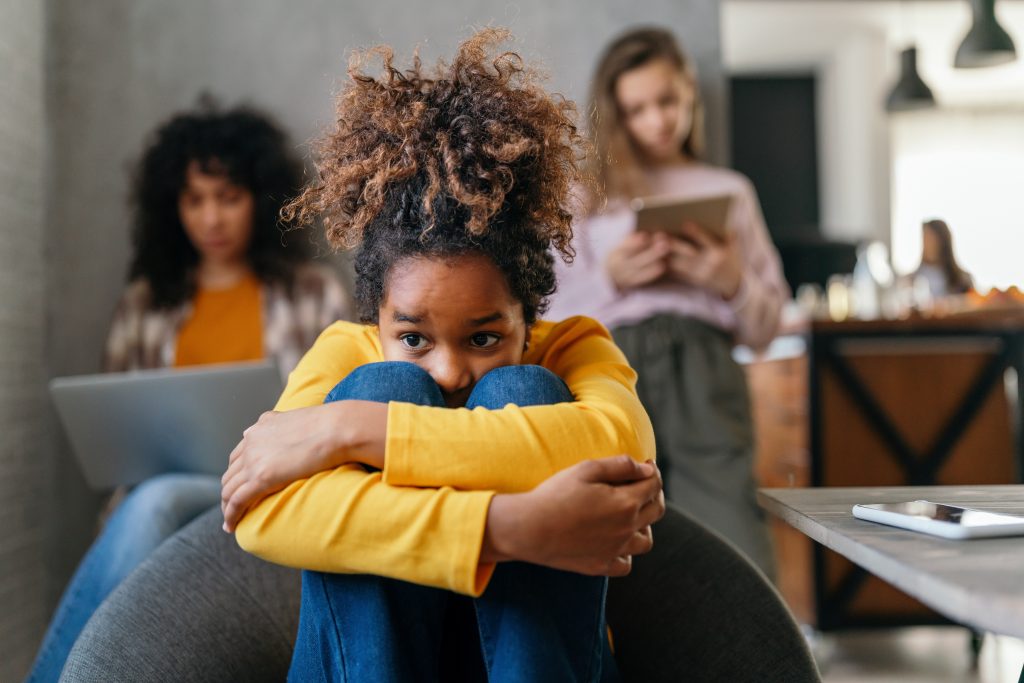
At the beginning of each school year, I give my high school students a survey. Among other questions, I always ask, “Is there anything else you’d like me to know to help this be a successful year?” This year, one answer dominated the rest. “I struggle with depression and anxiety.”
While my survey was strictly unscientific, the results gave me a window into the minds of this group of high schoolers. And the view has given me something to think about, especially relating to the correlation between technology and depression and technology and anxiety in our teenagers’ lives.
How Does Technology Affect Our Emotional Health?
Before COVID-19, teenagers already grappled with the balance between tech time and face-to-face interaction. But then throw in a worldwide pandemic and subsequent lockdown and screens suddenly became not only nice to have but necessary to function.
In my own home, my teenage son went from a crazy busy schedule (which he loved) to spending every waking hour in front of a screen. If he wasn’t attending a class on Zoom or completing online assignments, he was watching movies, scrolling ESPN for the latest sports updates (which were, sadly, also on hold), or spending hours gaming remotely with friends just to keep a social connection. Pretty much the only time he didn’t have his face in front of a screen during those first couple months was to emerge for food or sleep. And his mental health tanked.
We learned quickly that something needed to change.
By the Numbers
I don’t consider myself a numbers girl, but some recent numbers caught my attention. According to one study, mental health insurance claims for teens skyrocketed 103.5% in April 2020 compared to similar claims in April 2019. Likewise, self-harm claims for teens in the United States nearly doubled (99.8%) from April 2019 to April 2020. And if those numbers don’t give you pause, consider this one. Overdose-related claims jumped 119.3% in April 2020 as opposed to April 2019. And a recent study of 3,300 high schoolers showed that nearly one-third of those surveyed admitted to feeling unhappy or depressed.
Startling, right? It appears that during this forced isolation, teens have struggled more with mental health issues like anxiety and depression. And they’re still trying to climb their way out.
Creating a Balance of Good Health
Experts differ on the impact of tech and mental health issues. Some claim that there is a correlation between overuse of technology and anxiety levels in our teenagers while others purport no connection. However, it’s clear that teenagers who spend inordinate amounts of time in front of tech with little to no social interaction struggle emotionally.
So, what’s the answer?
Eliminating tech is not the cure for anxiety and other mental health issues in teens. Even if they weren’t using tech for the new brand of education (which they are, whether it be due to lockdowns, hybrid school models, or just as a tool for teaching in today’s world), our teens still use tech as a viable way to connect with friends, participate in a larger online community, and assimilate to the world around them.
But they also need time away from tech for a balance of good health. Our kids need face-to-face interactions, both in their own social circles as well as with others in their broader community. They need to learn to navigate real-life relationships. They need to participate in adolescent rites of passage like prom, graduation, teams and clubs, and good old-fashioned “hanging out.” They need to practice coping skills in uncomfortable social settings. And they need to depend on friends and loved ones in tangible ways when they are struggling with mental health concerns. For these particular needs, tech just can’t do the job.
Warning Signs
If you’re wondering if your own teenagers are struggling with anxiety or other mental health issues, consider the following signs.
- Mood changes
- Withdrawing from friends or family
- Loss of interest in things they used to love
- Sleep issues
- Appetite changes
- Difficulty with memory or concentration
- Changes in schoolwork
- Lack of personal hygiene
- Risky behavior
- Thoughts about suicide or self-harm
If your teens struggle with any of these, especially if they accompany a marked increase in tech use, talk to a professional and consider reevaluating their tech/real-life balance.
Making It Work
The reality is that screen time and teens go together. That’s the way of the world these days. But if they struggle with anxiety or other mental health issues, consider managing the time they spend on tech. With the right balance, tech can work hand in hand with other solutions to support good mental health.
